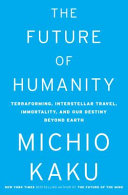

In 'The Future of Humanity', the author presents a compelling exploration of the various pathways that lie ahead for human civilization. The book addresses pressing issues such as climate change, technological advancemen...
Continue readingThe book emphasizes the necessity of space exploration as a means of ensuring the survival of human civilization. With Earth facing increasing threats from climate change, nuclear proliferation, and potential asteroid im...
Continue readingThe book discusses the rapid pace of technological advancements, particularly in artificial intelligence, biotechnology, and space technology. It highlights the dual-edged nature of these advancements—while they hold the...
Continue readingA major theme in the book is the necessity for global cooperation to address the challenges that humanity faces. Climate change, pandemics, and space exploration are issues that transcend national borders. The author arg...
Continue readingThe future of humanity may involve significant changes to our biology through genetic engineering. The author explores the potential of CRISPR technology and other advancements in genetics to enhance human capabilities, ...
Continue readingThe book delves into the scientific quest to find extraterrestrial life, discussing its implications for humanity's understanding of its place in the universe. The author posits that discovering intelligent life beyond E...
Continue readingEducation is presented as a critical factor in preparing humanity for the challenges of the future. The author advocates for an education system that emphasizes critical thinking, creativity, and adaptability to equip in...
Continue readingThe book underscores the urgent need for sustainability and responsible stewardship of Earth's resources. The author argues that humanity must transition to sustainable practices to combat climate change and preserve the...
Continue readingThe reading time for The Future of Humanity depends on the reader's pace. However, this concise book summary covers the 7 key ideas from The Future of Humanity, allowing you to quickly understand the main concepts, insights, and practical applications in around 25 min.
The Future of Humanity is definitely worth reading. The book covers essential topics including The Imperative of Space Exploration, Technological Advancements and Their Ethical Implications, The Importance of Global Cooperation, providing practical insights and actionable advice. Whether you read the full book or our concise summary, The Future of Humanity delivers valuable knowledge that can help you improve your understanding and apply these concepts in your personal or professional life.
The Future of Humanity was written by Michio Kaku.
If you enjoyed The Future of Humanity by Michio Kaku and want to explore similar topics or deepen your understanding, we highly recommend these related book summaries:
These books cover related themes, complementary concepts, and will help you build upon the knowledge gained from The Future of Humanity. Each of these summaries provides concise insights that can further enhance your understanding and practical application of the ideas presented in The Future of Humanity.